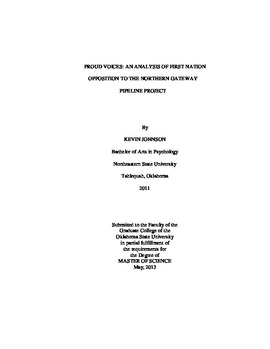| dc.contributor.advisor | Gill, Duane | |
| dc.contributor.author | Johnson, Kevin | |
| dc.date.accessioned | 2014-09-24T14:18:04Z | |
| dc.date.available | 2014-09-24T14:18:04Z | |
| dc.date.issued | 2013-05-01 | |
| dc.identifier.uri | https://hdl.handle.net/11244/11095 | |
| dc.description.abstract | This thesis examines dynamics between indigenous populations and modern industrial development by examining sociocultural impacts that development of the Enbridge Northern Gateway Project (ENGP) poses to First Nations. The ENGP proposes construction of two parallel pipelines from Alberta, Canada to the coast of British Columbia, Canada, through traditional territories of many First Nations. Most First Nations along the pipeline route maintain core aspects of their traditional subsistence culture. Reliance on renewable natural resources makes subsistence cultures informed and resilient when confronting natural disasters. However, the ENGP introduces ecological hazards which are socioculturally foreign to the First Nations, namely threats of an environmental disaster from an oil spill. As part of the Canadian government's evaluation of the ENGP, a Joint Review Panel (JRP) was tasked with evaluating potential impacts posed by the project. Part of this evaluation process involved hearings at which First Nations offered their perspectives on the project, primarily how the ENGP would affect their way of life. Using transcriptions of these testimonies as data, common discursive themes used by First Nations were determined and used to understand the sociocultural impacts of the ENGP as they are perceived by the First Nations. Three First Nations bands are examined: the Gitga'at of Hartley Bay, British Columbia, Canada, and the Lake Babine and Wet'suwet'en of Burns Lake, British Columbia, Canada. Theme usage is compared and contrasted between groups. Differences in narrative theme usage are observed between groups, which are attributed to bioregional differences and varying experiences in sociocultural history. While both groups unanimously opposed the ENGP and had similar proportions of theme use, the Gitga'at were more explicit in their discussions of threats to resources, and the Lake Babine and Wet'suwet'en were more emphatic on issues of sovereignty. | |
| dc.format | application/pdf | |
| dc.language | en_US | |
| dc.publisher | Oklahoma State University | |
| dc.rights | Copyright is held by the author who has granted the Oklahoma State University Library the non-exclusive right to share this material in its institutional repository. Contact Digital Library Services at lib-dls@okstate.edu or 405-744-9161 for the permission policy on the use, reproduction or distribution of this material. | |
| dc.title | Proud Voices : an Analysis of First Nation Oppostiion to the Northern Gateway Pipeline Project | |
| dc.type | text | |
| dc.contributor.committeeMember | Knottnerus, John David | |
| dc.contributor.committeeMember | Perkins, Stephen M. | |
| osu.filename | Johnson_okstate_0664M_12791.pdf | |
| osu.accesstype | Open Access | |
| dc.description.department | Sociology | |
| dc.type.genre | Thesis | |
